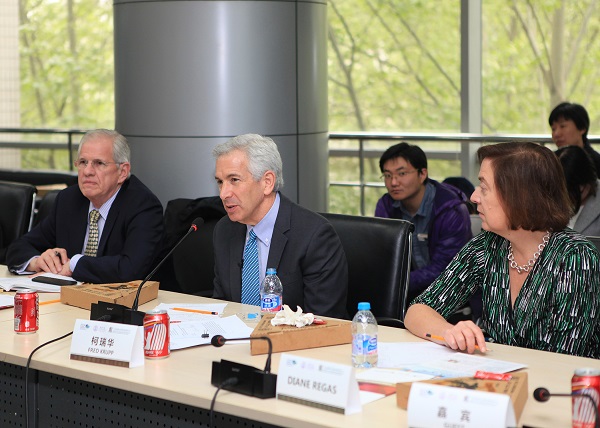CIDEG Lecture on “Can America meet its commitments to statement of China-U.S. Climate Change”Release time: 2016-06-06
On April 19th, 2016,Fred Krupp, the chairman of Environmental Defense Fund(EDF) and an outstanding visiting researcher of the School of Public Policy and Management, Tsinghua University (SPPM),delivered a lecture entitled “Can America Meet its Commitments to China-U.S. Joint Statement on Climate Change: Look into American Climate Political Economy Through CPP” in Room 302, SPPM. Prof. Xue Lan, Dean of SSPM, Director of the Center for Industrial Development and Environmental Governance at Tsinghua University (CIDEG), hosted the lecture. Daniel J.Dudek and Diane Regas, vice-chairman and executive chairman of EDF respectively attended the lecture together. Liu Qiang, Director of the National Center for Climate Change Strategy and International Cooperation (NCSC), made a comment on the lecture as a distinguished guest.
Professor Xue Lan firstly made an introduction of the lecturer and the background of the speech. He pointed out that as global warming has become one of the threats to the existence of human beings, scientific research of carbon reduction has been under the spotlight. In November 2014, the China-U.S. Joint Statement on Climate Change was signed in Beijing, in which America promised a 26 to 28 per cent reduction of carbon emission from 2005 levels by 2025. Clean Power Plan (CPP), promulgated by President Barack Obama in August 2015, with the intention to set limitations to greenhouse gas emission in electric power industry encountered fierce opposition from the main stakeholders.

Fred Krupp then illustrated the context of CPP in detail. He stated that CPP, as the first national standard for carbon dioxide emission, had positive influences on the environment, health and economy.CPP guaranteed a significant reduction of pollutant emission and was estimated to decrease approximately 3600 premature births,1700 heart attacks and 90000 asthma, bringing 26 to 45 billion dollars indirect benefits.
Moreover, Fred Krupp stated that the validity system of CPP was elastic for each state was given the rights to manage the electric power enterprises within the state with its own standards while states without plausible plans were required to obey the national standards set by US Environmental Protection Agency (EPA). Explicit emission reduction plans were attainable for electric power enterprises, while rewards were offered if reduction targets were achieved before due. Meanwhile, carbon emission trading was allowed to keep transaction costs down and promote emission reduction, which in turn enhance the feasibility of CPP.
Furthermore, Fred Krupp indicated that actions such as adequate preparation time, elastic emission targets and flexible implementation system were also taken by CPP to ensure the feasibility of CPP and make emission reduction affordable for electric power enterprises.

However, requests for suspending CPP were made by several states and enterprises in October 2015 and the plan was temporarily halted in February 2016, expected to get a re-examine in 2007.
Lastly, Liu Qiang made a remark on the lecture. He concluded that China, as a global player, had a responsibility to support emission reduction. China should draft out its long-term plan in climate governance by drawing lessons from CPP, which would be of significance for the implementation of the 13th Five-Year Plan.
The lecture ended with discussions on CPP and many other related topics among Fred Krupp and the audience who were present.
